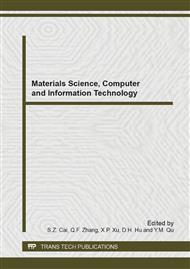p.1547
p.1551
p.1555
p.1561
p.1566
p.1570
p.1574
p.1578
p.1582
Research on Blind Source Separation Algorithm Based on Particle Swarm Optimization
Abstract:
Blind source separation (BSS) is a technique for recovering a set of source signals without priori information on the transformation matrix or the probability distributions of the source signals. In the previous works of BSS, the choice of the learning rate would reflect a trade-off between the stability and the speed of convergence. In this paper, a particle swarm optimization (PSO)-based learning rate adjustment method is proposed for BSS. In the simulations, three source signals are mixed and separated and the results are compared with natural gradient algorithm. The proposed approach exhibits rapid convergence, and produces more efficient and more stable independent component analysis algorithms than other related approaches.
Info:
Periodical:
Pages:
1566-1569
Citation:
Online since:
July 2014
Authors:
Price:
Сopyright:
© 2014 Trans Tech Publications Ltd. All Rights Reserved
Share:
Citation:


